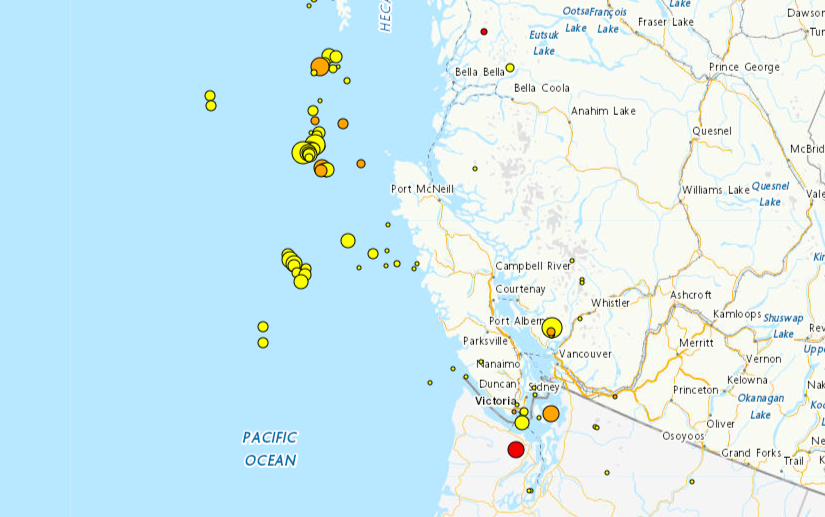Search KamloopsBCNow
- Food & Drink
- Biz+Tech
- Columns
- Travel & Lifestyle
- Arts & Culture
- News & City Info
- Events
- Webcams
- Advertise
- Real Estate
- Contests
- Best Of the city
- Faces of Kamloops
- More
- Real Estate Listings
- Subscribe
- Contact

Residents across Vancouver Island and the Lower Mainland have been noticing increased earthquake activity recently, but according to experts there’s no immediate cause for alarm.
Taimi Mulder, a seismologist with Natural Resources Canada in Sydney, says that the earthquakes, although a little unusual, are still within the normal range for the region.
Mulder adds that people have reported feeling the quakes, but in the grand scheme of things they’re considered relatively small events.
On whether we can expect to feel more earthquakes in the near future, she says it’s difficult to precisely predict.
“Mother Nature has her own plans, so I can't stay, but usually you can get a cluster of activity like this and then it might be quieter for a while.”
It could be many months before BC residents in the area feel another quake, or we could continue to get some smaller events.
Sometimes, a series of small earthquakes can mean a larger earthquake is building, but Mulder says that isn’t a concern in this case since the recent events haven’t been related and have not been aftershocks.
“The most recent one in the Olympic Peninsula was down in the Juan de Fuca plate,” Mulder explains. “The last three were up in the North America plate, and we had one earlier in February that was down on the Juan de Fuca plate—so all of them have not been in the same tectonic plate and they’re also fairly widely separated.”
We still know that the “Big One” is still on the way, but we don’t know exactly when.
Mulder explains that what we do know is that the event will be a magnitude 8 to 9 earthquake, and it will occur sometime in the next 500 years somewhere between halfway down Vancouver Island to the California Oregon border.
According to Natural Resources Canada, geological evidence indicates that 13 great earthquakes have occurred in the last 6,000 years and the most recent one was 325 years ago.
On January 26, 1700, one of the world's largest earthquakes occurred along the west coast of North America, triggering landslides and a massive tsunami.
We know as much as we do about the event in part due to records and descriptions kept in Japan of the tsunami, which swept across the Pacific and caused destruction along the country’s coast.
The event was also recorded in the oral traditions of the First Nations people on Vancouver Island. In one such record, it is said that the tsunami wiped out the entire winter village of the Pachena Bay people, leaving no survivors.
“I don't think that the earthquakes that occurred this year are bringing us any closer further away from it,” Mulder says about the next big earthquake. "They're just part of the normal earthquake pattern in the area and the stress that builds up for these very large earthquakes is something that accumulates over hundreds of years."
“I wouldn't be anxious,” she adds. “I think it's a great reminder that we do get earthquakes here and to be prepared and know what you're going to do.”
Mulder says people should make sure they have a complete earthquake kit that includes fresh water, some food, something to keep you dry and warm and something that will allow you to communicate and get news other than your phone.
“Recognize that if there's a very big earthquake your cell phone may not be functional. You may need a radio and batteries in order to get news. Be prepared, and remember to drop, take cover and hold on if you feel shaking.”
More information on earthquake preparedness is available here.